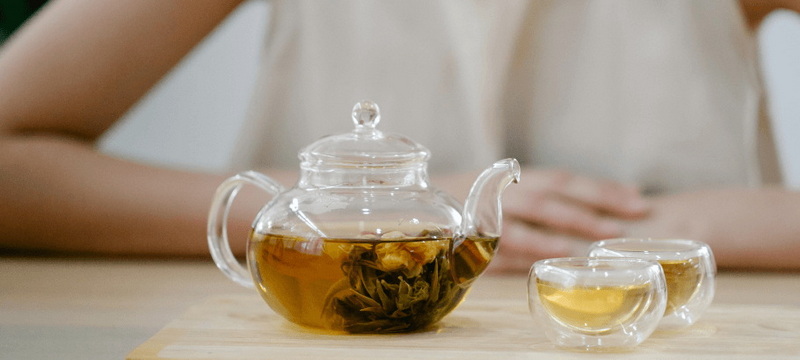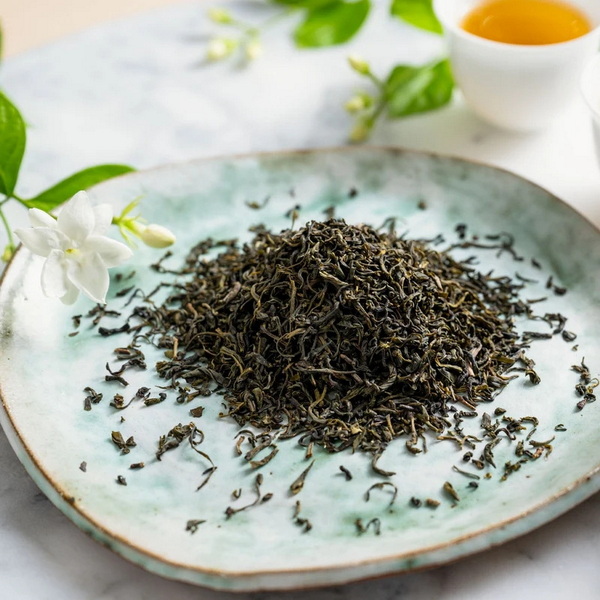Content Menu
● Introduction to Green Tea and L-Theanine
>> Green Tea Components
● Effects of Green Tea on Skin Health
>> L-Theanine's Role in Skin Health
● Clinical Evidence and Studies
>> Green Tea Extract Composition
● Incorporating Green Tea into Your Skincare Routine
● Potential Future Research Directions
● Conclusion
● Frequently Asked Questions
>> 1. What are the main components of green tea that benefit skin health?
>> 2. How does green tea protect the skin from UV damage?
>> 3. Can l-theanine directly improve skin health?
>> 4. What are the potential side effects of consuming green tea for skin health?
>> 5. How can I incorporate green tea into my skincare routine?
● Citations:
Green tea, known for its rich composition of catechins and other bioactive compounds like l-theanine, has been extensively studied for its potential benefits in skin health. L-theanine, a unique amino acid found in green tea, is known for its calming effects and various health benefits. This article delves into the impact of green tea l-theanine on skin health, exploring its antioxidant, anti-inflammatory, and other beneficial properties.

Introduction to Green Tea and L-Theanine
Green tea, derived from the leaves of Camellia sinensis, is renowned for its high content of catechins, particularly epigallocatechin gallate (EGCG), and other compounds like caffeine and l-theanine. L-theanine is an amino acid that contributes to the relaxation and calming effects often associated with green tea consumption.
Green Tea Components
- Catechins: Known for their antioxidant and anti-inflammatory properties, catechins are crucial in protecting the skin from damage caused by UV radiation and oxidative stress.
- L-Theanine: This amino acid is recognized for its ability to induce relaxation and reduce stress levels, which can indirectly benefit skin health by minimizing stress-related skin issues.
Effects of Green Tea on Skin Health
Green tea has been studied extensively for its potential benefits in improving skin health. These benefits include:
1. Antioxidant Properties: Green tea extracts have been shown to increase endogenous antioxidant defenses, protecting the skin from oxidative damage and promoting healthier skin.
2. Anti-Inflammatory Effects: By inhibiting enzymes involved in prostanoid biosynthesis and modulating cytokine secretion, green tea extracts can reduce inflammation, which is beneficial in managing skin conditions like acne and dermatitis.
3. Photoprotection: Green tea catechins, especially EGCG, have been found to protect the skin against UV-induced damage, which can lead to photoaging and skin cancer.
4. Skin Regeneration: Green tea extracts can stimulate collagen and elastin production, enhancing skin elasticity and texture.
L-Theanine's Role in Skin Health
While l-theanine is primarily known for its neuroprotective and stress-reducing effects, its indirect benefits on skin health are noteworthy. Reduced stress levels can lead to improved skin health by minimizing stress-induced skin issues such as acne and rosacea.

Clinical Evidence and Studies
Several clinical studies have evaluated the effects of green tea on skin health:
- Photoaging: Studies have shown mixed results, with some indicating improvements in skin elasticity and texture, while others found minimal effects on photoaging.
- Acne and Genodermatosis: Green tea extracts have been explored for their potential in reducing sebum production and inflammation associated with acne, though more research is needed.
- Antioxidant Defenses: Green tea supplementation has been shown to enhance skin antioxidant defenses, potentially improving skin integrity.
Green Tea Extract Composition
| Compound | Percentage Composition |
| EGCG | 38-70% |
| ECG | 7-14% |
| EC | 6-7% |
| EGC | 4-6% |
| GCG | 1-4% |
| Caffeine | <0.5-0.7% |
Incorporating Green Tea into Your Skincare Routine
Incorporating green tea into your skincare routine can be done in several ways:
1. Topical Application: Green tea can be used as a face mask or toner to provide direct antioxidant benefits to the skin.
2. Oral Consumption: Drinking green tea or taking green tea supplements can enhance skin health from the inside out by boosting antioxidant defenses and reducing inflammation.
3. Combination with Other Ingredients: Green tea extracts can be combined with other skincare ingredients like vitamin C or retinol to enhance their effectiveness.
Potential Future Research Directions
Future studies should focus on:
1. Long-Term Effects: Investigating the long-term benefits and safety of green tea consumption for skin health.
2. Mechanisms of Action: Further elucidating the molecular mechanisms by which green tea compounds exert their effects on skin cells.
3. Combination Therapies: Exploring the potential of combining green tea extracts with other natural compounds to enhance skin benefits.
Conclusion
Green tea, particularly its l-theanine content, offers potential benefits for skin health through its antioxidant, anti-inflammatory, and stress-reducing properties. While direct evidence linking l-theanine to skin health is limited, its overall health benefits can indirectly support better skin conditions. Further research is needed to fully understand the effects of green tea l-theanine on skin health.

Frequently Asked Questions
1. What are the main components of green tea that benefit skin health?
The main components include catechins (especially EGCG), l-theanine, and caffeine. Catechins provide antioxidant and anti-inflammatory effects, while l-theanine helps reduce stress.
2. How does green tea protect the skin from UV damage?
Green tea extracts, particularly EGCG, have been shown to protect the skin by reducing UV-induced erythema and promoting photoprotection, which helps prevent photoaging and skin cancer.
3. Can l-theanine directly improve skin health?
While l-theanine is primarily known for its neuroprotective effects, it indirectly benefits skin health by reducing stress levels, which can minimize stress-related skin issues.
4. What are the potential side effects of consuming green tea for skin health?
Common side effects include gastrointestinal issues, especially at high doses. Caffeine sensitivity should also be considered.
5. How can I incorporate green tea into my skincare routine?
You can use green tea topically as a face mask or consume it orally as a supplement. Always consult with a healthcare provider before starting any new supplements.
Citations:
[1] https://pmc.ncbi.nlm.nih.gov/articles/PMC9370301/
[2] https://pmc.ncbi.nlm.nih.gov/articles/PMC6930595/
[3] https://www.nature.com/articles/s41598-024-59383-y
[4] https://www.healthline.com/health/l-theanine
[5] https://pmc.ncbi.nlm.nih.gov/articles/PMC9014247/
[6] https://cn.iherb.com/blog/l-theanine/1446
[7] https://www.mdpi.com/2079-9284/9/5/96
[8] https://pubmed.ncbi.nlm.nih.gov/31758301/






























